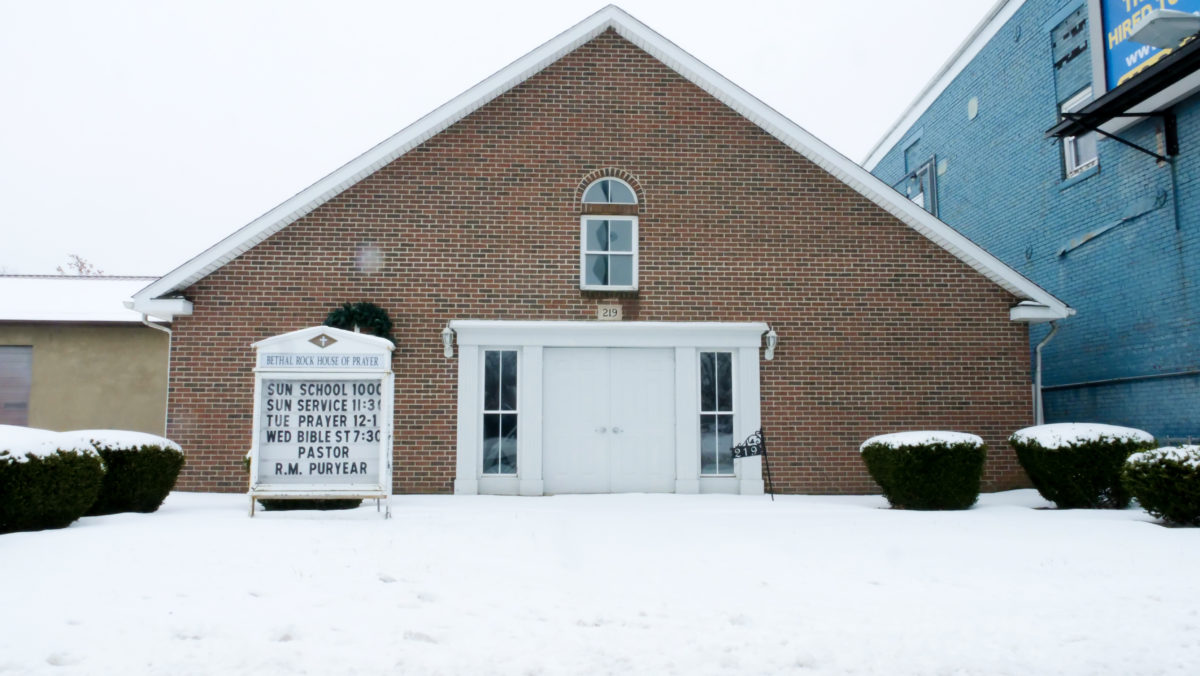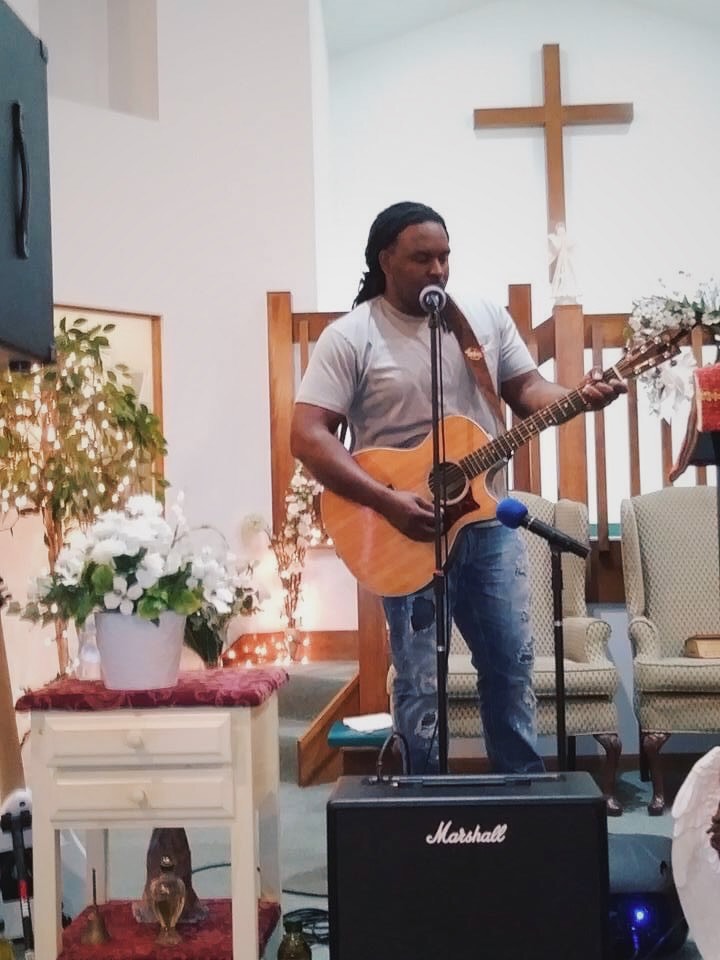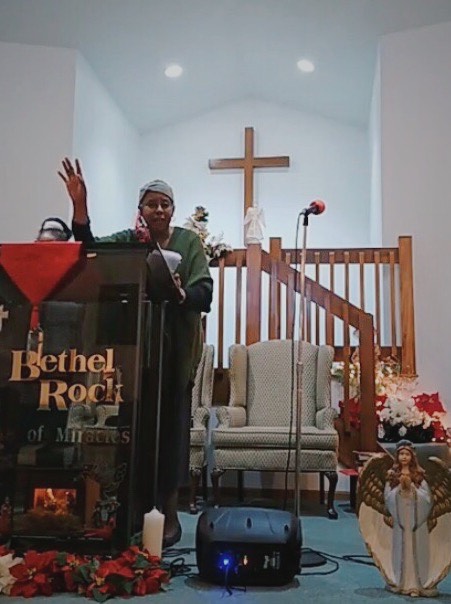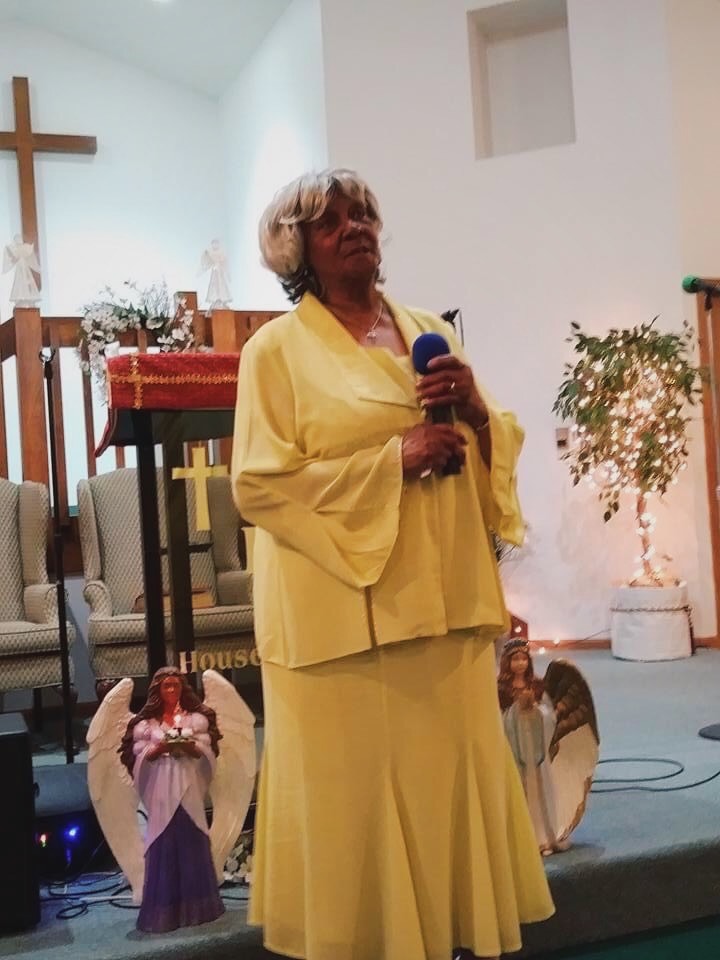This story is the first part of a series of written and audio stories called Black Lives in Licking County, a collaboration between the NAACP of Licking County, The Reporting Project @ Denison University, and the Newark Advocate.
NEWARK – On Christmas Eve four years ago, Sister Bertha Stigger stood poised in front of a wooden cross at Bethel Rock House of Prayer in Newark, Oh., ready to sing the gospel. Stigger began to sing in her warm, brassy tones, a gentle piano accompanying her. Slowly, as the music crescendoed, emotional cries welled up from the pews.
Overwhelmed with joy, congregants raised their hands in praise, one by one, and then joined in unison singing, “Holy one.” Stigger bellowed the gospel tune, “Holy one, holy one, we worship you, we bow down, we worship you, holy one,” as the spirit moved among the congregation, and they were consumed by it.
It’s this spirit and emotional experience of a worship service that brings folks together at Bethel Rock, and has helped build this tight-knit but welcoming community, a place open to all comers, according to church member Desiree Blake, mother of Newark City councilmember Jeremy Blake.
“I could stay home and watch television all day every day and go about my day,” says Minister Mary Jane Heflin, of Bethel Rock House of Prayer. “But it’s just something about coming together in church and worshiping, spiritually.”
A visitor to the church posted on Facebook that when he attended in 2018, “We were all ages, from infant to eighty plus, and all colors of the rainbow. We sang, prayed, and laughed and even cried tears of joy. There was no judgement, no fashion show, no gossip, politics, racism, homophobia, or negativity of any kind…Why can’t we just do that every day?” He sensed that this church was a special place.
The pandemic has made it harder for the congregation to gather. The church has been limited to only having services on Sundays, with social distancing and masks required. Pastor Reecior Puryear is currently recovering from illness, but is expected to be back behind the pulpit soon. Despite these challenges, they have gathered in song and continued the traditions of this church, long a part of Newark’s Black community.
Bethel Rock, located on 219 East Main St., was founded by Pastor Reecior Puryear in 1984 in response to a vision that she said she had received from God. Heflin says “God gave [Pastor Puryear] that vision [to start the church]. God spoke to her and said, ‘Don’t keep my people waiting.’’ Soon, Puryear formed a charter of about five or six people around the table in her home.
Heflin says that founding and fostering this church community has been Puryear’s life’s work.
Pastor Puryear told the Newark Advocate in 2017 that people come and go from the church, which has about 50 to 70 members, but she is more concerned about God meeting the spiritual needs of the people who are there.
“My main concern is people bettering themselves by being obedient to the spirit of God,” Puryear said.
During the first service on October 14, 1984, the church house overflowed with people who wanted to see the young Pastor Puryear preach the power of the Gospel. Bethel started in an old theater building on the corner of Wildwood Avenue and Poplar Avenue in Newark. The people in the community banded together and helped fix it up for use. They donated a piano, an organ, and more to get the church started. After the service was over, they had a potluck dinner in the backyard, with many more to follow.
Years ago, a storm ruined the first church location, but this didn’t stop the worshippers. They hopped to different locations for services: “We had church in the home, we had it downtown,” says Heflin. “We went from there to an abandoned bar out east… After that, the Lord made a way for us to get a loan from the bank, and we built a church.”
Over the years, the church has changed locations, but the spirit within the congregation has remained steadfast and Sunday mornings a time for congregants to connect with their faith. The name Bethel Rock has its roots in the story of God speaking to Jacob in Genesis 35:1: “Let us arise, and go up to Bethel; and I will make there an altar unto God, who answered me in the day of my distress, and was with me in the way which I went…”
Members say that Bethel Rock House of Prayer is a place of solace when in distress, but it’s the moments of hope and praise that make this church unique.
“When you walk into Bethel, you can feel the spirit of the Lord and the people,” says Mrs. Blake. “You feel comfortable. You know there’s something there.”
Blake has found her place at Bethel Rock because, she said, Pastor Puryear is “a good woman of God…. [saying] right what the Lord wants her to say to her congregation. And I just felt that’s where I need to be.”
Minister Heflin says there is freedom in worship here, “We believe in just letting go and let God. We believe in just lifting our hands and just praising God in worship, singing and worshiping and just praising God, dancing in the spirit.”
At Bethel, anyone can have a role in the church community. Blake used to help watch the kids, lead a Bible study, but now she just enjoys going to church, praising the Lord, and fellowshipping with everyone. Hefflin, with a peaceful and calming presence, fills in wherever she’s needed–from Sunday school to prayer hour to singing with the praise team.
Mrs. Blake said that Bethel’s young people and children don’t go to services as much as they used to. Across the nation, there has been a trend of religious disaffiliation. And according to a 2020 study by the Pew Research Center, even though most teens in the United States share the religious views of their parents, they’re more likely to say they’re less religious than their parents.
But Blake and Heflin believe this church will carry on well into the future.
Heflin wants Bethel’s legacy “to be that light that’s set on the hill that cannot be hidden, to let them know that Christ is the way, the truth, and the life… That we could be that light to the world.”
And Heflin adds, a church that continues to say, “When you accept Jesus Christ…. You will know. It just feels different. You will know that your life is not the same as it was….Because the Spirit of the Lord will lead you, it will guide you, it will direct you, it will instruct you, it will teach you the way to go, how to live.”
On that Christmas Eve four years ago, as Sister Bertha Stigger’s soulful song drew to a close, the congregation lingered with their hands raised in praise to the Lord, a holy moment altogether.
The pianist played a final note as everyone broke into applause.
“Yes, praise Jesus,” said an onlooker.




